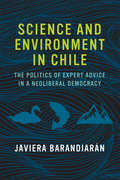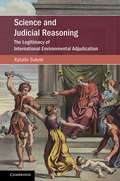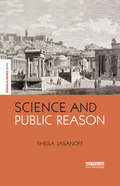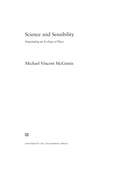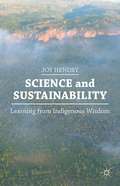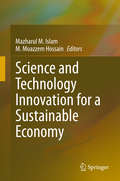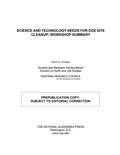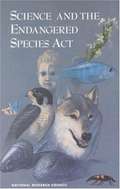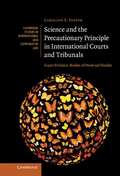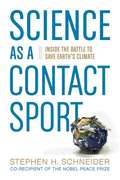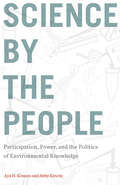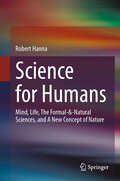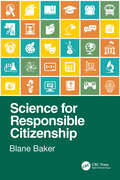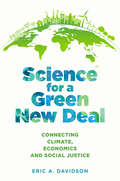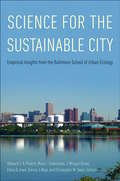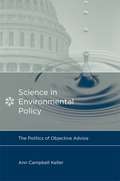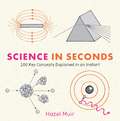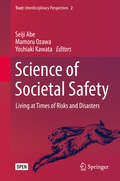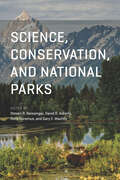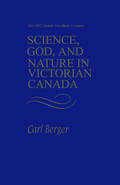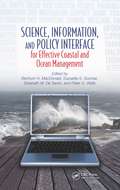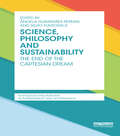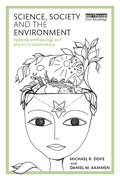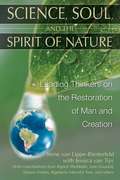- Table View
- List View
Science and Environment in Chile: The Politics of Expert Advice in a Neoliberal Democracy (Urban and Industrial Environments)
by Javiera BarandiaranThe politics of scientific advice across four environmental conflicts in Chile, when the state acted as a “neutral broker” rather than protecting the common good.In Science and Environment in Chile, Javiera Barandiarán examines the consequences for environmental governance when the state lacks the capacity to produce an authoritative body of knowledge. Focusing on the experience of Chile after it transitioned from dictatorship to democracy, she examines a series of environmental conflicts in which the state tried to act as a “neutral broker” rather than the protector of the common good. She argues that this shift in the role of the state—occurring in other countries as well—is driven in part by the political ideology of neoliberalism, which favors market mechanisms and private initiatives over the actions of state agencies. Chile has not invested in environmental science labs, state agencies with in-house capacities, or an ancillary network of trusted scientific advisers—despite the growing complexity of environmental problems and increasing popular demand for more active environmental stewardship. Unlike a high modernist “empire” state with the scientific and technical capacity to undertake large-scale projects, Chile's model has been that of an “umpire” state that purchases scientific advice from markets.After describing the evolution of Chilean regulatory and scientific institutions during the transition, Barandiarán describes four environmental crises that shook citizens' trust in government: the near-collapse of the farmed salmon industry when an epidemic killed millions of fish; pollution from a paper and pulp mill that killed off or forced out thousands of black-neck swans; a gold mine that threatened three glaciers; and five controversial mega-dams in Patagonia.
Science and Judicial Reasoning: The Legitimacy of International Environmental Adjudication (Cambridge Studies on Environment, Energy and Natural Resources Governance)
by Katalin SulyokScience, which inevitably underlies environmental disputes, poses significant challenges for the scientifically untrained judges who decide such cases. In addition to disrupting ordinary fact-finding and causal inquiry, science can impact the framing of disputes and the standard of review. Judges must therefore adopt various tools to adjust the level of science allowed to enter their deliberations, which may fundamentally impact the legitimacy of their reasoning. While neglecting or replacing scientific authority can erode the convincing nature of judicial reasoning, the same authority, when treated properly, may lend persuasive force to adjudicatory findings, and buttress the legitimacy of judgments. In this work, Katalin Sulyok surveys the environmental case law of seven major jurisdictions and analyzes framing techniques, evidentiary procedures, causal inquiries and standards of review, offering valuable insight into how judges justify their choices between rival scientific claims in a convincing and legitimate manner.
Science and Public Reason (The Earthscan Science in Society Series)
by Sheila JasanoffThis collection of essays by Sheila Jasanoff explores how democratic governments construct public reason, that is, the forms of evidence and argument used in making state decisions accountable to citizens. The term public reason as used here is not simply a matter of deploying principled arguments that respect the norms of democratic deliberation. Jasanoff investigates what states do in practice when they claim to be reasoning in the public interest. Reason, from this perspective, comprises the institutional practices, discourses, techniques and instruments through which governments claim legitimacy in an era of potentially unbounded risks—physical, political, and moral. Those legitimating efforts, in turn, depend on citizens’ acceptance of the forms of reasoning that governments offer. Included here therefore is an inquiry into the conditions that lead citizens of democratic societies to accept policy justification as being reasonable. These modes of public knowing, or “civic epistemologies,” are integral to the constitution of contemporary political cultures. Methodologically, the book is grounded in the field of Science and Technology Studies (STS). It uses in-depth qualitative studies of legal and political practices to shed light on divergent cross-cultural constructions of public reason and the reasoning political subject. The collection as a whole contributes to democratic theory, legal studies, comparative politics, geography, and ethnographies of modernity, as well as STS.
Science and Risk Regulation in International Law
by Jacqueline PeelThe regulation of risk is a preoccupation of contemporary global society and an increasingly important part of international law in areas ranging from environmental protection to international trade. This book examines a key aspect of international risk regulation - the way in which science and technical expertise are used in reaching decisions about how to assess and manage global risks. An interdisciplinary analysis is employed to illuminate how science has been used in international legal processes and global institutions such as the World Trade Organization. Case studies of risk regulation in international law are drawn from diverse fields including environmental treaty law, international trade law, food safety regulation and standard-setting, biosafety and chemicals regulation. The book also addresses the important question of the most appropriate balance between science and non-scientific inputs in different areas of international risk regulation.
Science and Sensibility: Negotiating an Ecology of Place
by Michael Vincent McginnisIf humans are to understand and discover ways of addressing complex social and ecological problems, we first need to find intimacy with our particular places and communities. Cultivating a relationship to place often includes a negotiating process that involves both science and sensibility. While science is one key part of an adaptive and resilient society, the cultivation of a renewed sense of place and community is essential as well. Science and Sensibility argues for the need for ecology to engage with philosophical values and economic motivations in a political process of negotiation, with the goal of shaping humans' treatment of the natural world. Michael Vincent McGinnis aims to reframe ecology so it might have greater "trans-scientific" awareness of the roles and interactions among multiple stakeholders in socioecological systems, and he also maintains that deep ecological knowledge of specific places will be crucial to supporting a sustainable society. He uses numerous specific case studies from watershed, coastal, and marine habitats to illustrate how place-based ecological negotiation can occur, and how reframing our negotiation process can influence conservation, restoration, and environmental policy in effective ways.
Science and Sustainability
by Joy HendryIndigenous science is often dismissed as quackery or nonsense, out of touch with progress and current events. However, Indigenous peoples have passed down vital information for generations, from which local plants help cure common ailments, to which parts of the land are unsuitable for buildings because of likely earthquakes. These scientific practices that have been developed by Indigenous peoples around the world have been largely ignored by Western colonizers in their lands. From Japan and New Zealand to Australia and Canada, Indigenous science involves environmentally-focused, sustainable practices that allow people to live with the land rather than in spite of it. Here, Hendry examines science through these Indigenous roots, problematizing the idea that Western science is the only type that deserves that name and drawing attention to some of its shortcomings. She takes the reader with her on the learning process and shares a myriad of sustainable examples that can be put into practice.
Science and Technology Innovation for a Sustainable Economy
by Mazharul M. Islam M. Moazzem HossainThis book discusses the subject of pathways to a sustainable economy through science and technology innovations which are regarded as the important components of the ‘4th Industrial Revolution’. The volume has been developed from Bangladesh’s ‘Vision 2041’ agenda which includes development actions needed to catch up with more developed nations. Most importantly, the goals of the ‘Vision 2041’ have been taken from the dreams of the architect of independent Bangladesh, Bangabandhu (Friends of Bengal) Sheikh Mujibur Rahman. His dream was to make Bangladesh the Switzerland of Asia. The Father of Bangladesh Nation was killed by assassins’ bullets along with his most of the family members in August 1975. After his death, the nation moved backwards while recovering from nine months of liberation post war in 1971.Between 1975 and 1990 Bangladesh was ruled by military and quasi military governments. Bangladesh established a true democratic regime in 1996 with Sheikh Mujib’s daughter, Sheikh Hasina, who formed the government after 21 years with a mandate to realise the dreams of her father. Sheikh Hasina, had her own 20 year vision for Bangladesh, called, ‘Vision 2021’, with plans to make the nation poverty free by 2021. After a pause between 2001 and 2008, Sheikh Hasina returned to power in 2009. Under her consecutive three terms she brought Bangladesh back on track and Bangladesh is one of the nations which reduced poverty half under MDGs by 2015. During her third consecutive term Sheikh Hasina, is on the way to transforming Bangladesh into a ‘middle income’ nation by 2021. This volume aims to identify and mitigate the challenges of ‘4th Industrial Revolution’ investigating the areas of science and technology innovations for Bangladesh and for other parts of the world keeping in mind establishing a sustainable economy under UN agendas to 2030 (SDGs). The primary audience for this book are UN development agencies, academic institutions, government policymakers and business leaders of the more developed and developing nations alike.
Science and Technology for DOE Site Cleanup: Workshop Summary
by National Research Council of the National AcademiesThe Department of Energy's Office of Environmental Management is developing a technology roadmap to guide planning and possible future congressional appropriations for its technology development programs. It asked the National Research Council of the National Academies to provide technical and strategic advice to support the development and implementation of this roadmap, specifically by undertaking a study that identifies principal science and technology gaps and their priorities for the cleanup program based on previous National Academies reports, updated and extended to reflect current site conditions and EM priorities and input form key external groups, such as the Nuclear Regulatory Commission, Defense Nuclear Facilities Safety Board, Environmental Protection Agency, and state regulatory agencies. In response, this book provides a high-level synthesis of principal science and technology gaps identified in previous NRC reports in part 1. Part 2 summarizes a workshop meant to bring together the key external groups to discuss current site conditions and science and technology needs.
Science and the Endangered Species Act
by Committee on Scientific Issues in the Endangered Species ActThe Endangered Species Act (ESA) is a far-reaching law that has sparked intense controversies over the use of public lands, the rights of property owners, and economic versus environmental benefits.In this volume a distinguished committee focuses on the science underlying the ESA and offers recommendations for making the act more effective.The committee provides an overview of what scientists know about extinction--and what this understanding means to implementation of the ESA. Habitat--its destruction, conservation, and fundamental importance to the ESA--is explored in detail.The book analyzes Concepts of species--how the term "species" arose and how it has been interpreted for purposes of the ESA. Conflicts between species when individual species are identified for protection, including several case studies. Assessment of extinction risk and decisions under the ESA--how these decisions can be made more effectively. The book concludes with a look beyond the Endangered Species Act and suggests additional means of biological conservation and ways to reduce conflicts. It will be useful to policymakers, regulators, scientists, natural-resource managers, industry and environmental organizations, and those interested in biological conservation.
Science and the Precautionary Principle in International Courts and Tribunals
by Caroline E. FosterBy canvassing a range of international scientific disputes, including the EC-Biotech and EC-Hormones disputes in the WTO, the Case concerning Pulp Mills and the Gabcíkovo-Nagymaros case in the International Court of Justice, and the Mox Plant and Land Reclamation cases dealt with under the United Nations Convention on the Law of the Sea, Caroline Foster examines how the precautionary principle can be accommodated within the rules about proof and evidence and advises on the boundary emerging between the roles of experts and tribunals. A new form of reassessment proceedings for use in exceptional cases is proposed. Breaking new ground, this book seeks to advance international adjudicatory practice by contextualising developments in the taking of expert evidence and analysing the justification of and potential techniques for a precautionary reversal of the burden of proof, as well as methods for dealing with important scientific discoveries subsequent to judgments and awards.
Science as a Contact Sport: Inside the Battle to Save Earth's Climate
by Stephen H. SchneiderA member of the Intergovernmental Panel on Climate Change that won the 2007 Nobel Peace Prize, Schneider (interdisciplinary environmental studies and biology, Stanford U.) draws on his own participation and other sources to trace the campaign to recognize and address climate change over the past four decades. His topics include smoke on the horizon, a fragile planet grows alarmed, the battle heats up and so does the world, the stories behind persistent distortion in the media, and what should keep people awake at night. Annotation ©2010 Book News, Inc., Portland, OR (booknews.com)
Science by the People: Participation, Power, and the Politics of Environmental Knowledge (Nature, Society, and Culture)
by Aya H. Kimura Abby KinchyCitizen science—research involving nonprofessionals in the research process—has attracted both strong enthusiasts and detractors. Many environmental professionals, activists, and scholars consider citizen science part of their toolkit for addressing environmental challenges. Critics, however, contend that it represents a corporate takeover of scientific priorities. In this timely book, two sociologists move beyond this binary debate by analyzing the tensions and dilemmas that citizen science projects commonly face. Key lessons are drawn from case studies where citizen scientists have investigated the impact of shale oil and gas, nuclear power, and genetically engineered crops. These studies show that diverse citizen science projects face shared dilemmas relating to austerity pressures, presumed boundaries between science and activism, and difficulties moving between scales of environmental problems. By unpacking the politics of citizen science, this book aims to help people negotiate a complex political landscape and choose paths moving toward social change and environmental sustainability.
Science for Humans: Mind, Life, The Formal-&-Natural Sciences, and A New Concept of Nature
by Robert HannaThis book presents and defends an original and paradigm-shifting conception of formal science, natural science, and the natural universe alike, that’s fully pro-science, but at the same time neither theological or God-centered, nor solipsistic or self-centered, nor communitarian or social-institution-centered, nor scientistic or science-valorizing, nor materialist/physicalist or reductive, nor—above all—mechanistic. It does this by presenting and defending what Robert Hanna calls the neo-organicist turn, including manifest realism and the three sub-parts of metaphysical organicism: liberal naturalism, mind-life continuity, and explanatory inversion, whereby mechanical systems are explained by grounding them in organic systems, and not the other way around. Or more briefly and simply put, the purpose of this book is to present and defend science for humans. As such, it will be highly interesting and profoundly relevant to graduate students and specialist researchers in philosophy and the formal-&-natural sciences.
Science for Responsible Citizenship
by Blane BakerScience for Responsible Citizenship helps the reader to understand how science works and how science can help us develop reasonable and logical solutions to worldwide problems. Basic science knowledge and possible solutions based on scientific reasoning are explored, with a focus on interdisciplinary topics including disease transmission, energy, and climate change. The book starts with discussing the role of science in modern society, before tackling the basic science of global warming, human health, chemical processes that contribute to life on Earth, and the importance of water. The second half of the book describes the science of the electrical grid, nuclear reactions, devices and reactors, the Earth’s habitability, electronics, and optics, and concludes with a look ahead at the scientific and technological challenges of future energy needs and sustainable energy. This book can be used as part of a general science course at the college level and is also accessible to anyone with a high school background.Key Features: Addresses the fundamentals of scientific knowledge and reasoning in a clear and accessible style Offers a timely exploration of several existential challenges that can be addressed by science Provokes and encourages thought on how to solve some of our global problems
Science for a Green New Deal: Connecting Climate, Economics, and Social Justice
by Eric A. DavidsonScience, not politics, can take us beyond the hype and headlines to forge a realistic green new deal.Since it was first proposed in the US House of Representatives, the Green New Deal has been hotly debated, often using partisan characterizations that critique it as extreme or socialist. The intent was not simply to fight climate change or address a specific environmental concern, but rather to tackle how climate change and other environmental challenges affect the economy, the vulnerable, and social justice—and vice versa. In Science for a Green New Deal, Eric Davidson dissects this legislative resolution. He also shows how green new deal thinking offers a framework for a much-needed convergence of the natural sciences, social science, economics, and community engagement to develop holistic policy solutions to the most pressing issues of our day. Davidson weaves the case for linkages among multiple global crises, including a pandemic that has reversed progress on fighting poverty and hunger, an acceleration of climate change that has exacerbated storms, floods, droughts, and fires, and a renewed awareness of profound social injustices highlighted by the Black Lives Matter movement.Illustrating these points with his personal life experiences as a child growing up in Montana and as a famed researcher leading a large scientific society, Davidson relates these complex challenges to our everyday lives and decision-making. How, he asks, can we extract from the Earth's resources what we need for the prosperity, well-being, and dignity of current and future generations of billions of people without exhausting or polluting those resources? Written in clear, jargon-free prose, Science for a Green New Deal is a realistic and optimistic look at how we can attain a more sustainable, prosperous, and just future.
Science for the Sustainable City: Empirical Insights from the Baltimore School of Urban Ecology
by J. Morgan Grove Mary L. Cadenasso Steward T. A. Pickett Elena G. Irwin Emma J. Rosi Christopher M. SwanA presentation of key findings and insights from over two decades of research, education, and community engagement in the acclaimed Baltimore Ecosystem Study In a world of more than seven billion people—who mostly reside in cities and towns—the Baltimore Ecosystem Study is recognized as a pioneer in modern urban social-ecological science. After two decades of research, education, and community engagement, there are insights to share, generalizations to examine, and research needs to highlight. This timely volume synthesizes the key findings, melds the perspectives of different disciplines, and celebrates the benefits of interacting with diverse communities and institutions in improving Baltimore’s ecology. These widely applicable insights from Baltimore contribute to our understanding the ecology of other cities, provide a comparison for the global process of urbanization, and inform establishment of urban ecological research elsewhere. Comprehensive, interdisciplinary, and highly original, it gives voice to the wide array of specialists who have contributed to this living urban laboratory.
Science in Environmental Policy: The Politics of Objective Advice
by Ann Campbell KellerScientists often bring issues to the policy agenda, translating scientific questions into everyday language and political terms. When Roger Revelle characterized Earth as a spaceship in testimony to Congress in 1957, his evocative language framed the issue of our planet's climate vulnerability in a way that technical discourse could not. In this book, Ann Campbell Keller examines the influence of scientists on environmental policymaking and makes the novel argument that scientists' adherence to the role of neutral advisor varies over the course of the policymaking process. Keller divides the policy process into three stages--agenda setting, legislation, and implementation--and compares scientists' influence on acid rain and climate change policy at these different stages over the course of several decades. She finds that scientists face more pressure to uphold the ideal of objectivity as policy-making processes advance and become more formalized, and thus are more likely to engage in advocacy and persuasion in the earlier, less formal, agenda-setting stage of the process. In the later, more structured legislative and implementation phases, scientists--working hard to give the appearance of neutral expertise--cede the role of persuader to others. Keller draws on theoretical work in political science and science studies and on empirical evidence from scientific reports, news coverage, congressional hearings, and interviews. Focusing on comparable cases and considering scientists' participation in them over time, she offers unique insights into how the context of decision making affects scientists' policy influence and emphasizes the multiple pathways by which scientific meaning is constructed in public settings.
Science in Seconds
by Hazel MuirSimple and accessible, Science in Seconds is a visually led introduction to 200 key scientific ideas. Each concept is readily absorbed through an easy-to-understand picture and a concise explanation.Concepts span all of the most fundamental scientific disciplines including Physics, Chemistry, Biology, Ecology, Biotechnology, Anatomy and Physiology, Medicine, Earth Science, Energy Generation, Astronomy, Spaceflight and Information Technology.From the Trade Paperback edition.
Science of Societal Safety: Living At Times Of Risks And Disasters (Trust Ser. #2)
by Seiji Abe Mamoru Ozawa Yoshiaki KawataThis open access book covers comprehensive but fundamental principles and concepts of disaster and accident prevention and mitigation, countermeasures, and recovery from disasters or accidents including treatment and care of the victims. Safety and security problems in our society involve not only engineering but also social, legal, economic, cultural, and psychological issues. The enhancement needed for societal safety includes comprehensive activities of all aspects from precaution to recovery, not only of people but also of governments. In this context, the authors, members of the Faculty of Societal Safety Science, Kansai University, conducted many discussions and concluded that the major strategy is consistent independently of the type and magnitude of disaster or accident, being also the principle of the foundation of our faculty.The topics treated in this book are rather widely distributed but are well organized sequentially to provide a clear understanding of the principles of societal safety. In the first part the fundamental concepts of safety are discussed. The second part deals with risks in the societal and natural environment. Then follows, in the third part, a description of the quantitative estimation of risk and its assessment and management. The fourth part is devoted to disaster prevention, mitigation, and recovery systems. The final, fifth part presents a future perspective of societal safety science.Thorough reading of this introductory volume of societal safety science provides a clear image of the issues. This is largely because the Japanese have suffered often from natural disasters and not only have gained much valuable information about disasters but also have accumulated a store of experience. We are still in the process of reconstruction from the Great East Japan earthquake and the Fukushima nuclear power plant accident. This book is especially valuable therefore in studying the safety and security of people and their societies.
Science, Conservation, and National Parks
by Gary E. Machlis David D. Ackerly Holly Doremus Steven R. BeissingerAs the US National Park Service marks its centennial in 2016, parks and protected areas worldwide are under increasing threat from a variety of factors, including storms and fires of greater severity, plant and animal extinctions, the changing attitudes of a public that has become more urbanized, and the political pressures of narrow special interest groups. In the face of such rapid environmental and cultural changes, Science, Conservation, and National Parks gathers a group of renowned scholars—including Edward O. Wilson, Jane Lubchenco, Thomas Dietz, and Monica Turner, among many others—who seek to address these problems and, in so doing, to secure a future for protected areas that will push forward the frontiers of biological, physical, and social science in and for parks. Examining the major challenges of parks and protected areas throughout the world, contributors provide answers to a number of key conservation questions, such as: How should stewardship address climate change, urban encroachment and pollution, and invasive species? How can society, especially youth, become more engaged with nature and parks, and are there models to guide interactions between parks and their neighbors? What are appropriate conservation objectives for parks in the Anthropocene? Charting a course for the parks of the next century, Science, Conservation, and National Parks is certain not only to catalyze the continued evolution of US park conservation policy, but also to be an inspiration for parks, conservation, and management worldwide.
Science, God, and Nature in Victorian Canada: The 1982 Joanne Goodman Lectures
by Carl BergerProfessor Berger aims in this book to 'explore the rise, expression, and relative decline of the idea of natural history' in Canada, during the age of Victoria. Science, particularly natural science, was then accessible to the general public in a way scarcely imaginable today. Natural history societies were set up in a number of cities and provided a focus for the descriptive and collecting activities of amateurs and incipient professionals. These societies acted as social clubs and vehicles for self-improvement as well as providing excellent training for the amateur scientist. The Baconian assumptions that inspired the Victorian collectors and scientists were one of the major victims of the Darwinian revolution, and their demise brought about the gradual decline of the natural history societies. Professor Berger considers also the sense of wonder and reverence with which Victorian Canadians, like their British contemporaries, looked at the varieties and delights of nature. The British tradition of natural theology had a great impact on the pursuit of science in Victorian Canada, leading naturalists and poets alike to seek in the uncharted flora and fauna of their new land the handiwork of a benevolent God. The author examines the impact of the discoveries of Darwin on this tradition and on the relations between science and religion, as the creator and the act of creation became more and more distant in time and more tenuously connected to the world of nature around us.His study provides many rich insights into the practice and theory of natural history in an age when even a veteran politician could look back and recall, with understanding and in detail, the world of nature in the countryside of his youth.
Science, Information, and Policy Interface for Effective Coastal and Ocean Management
by Bertrum H. MacDonaldThis book provides a timely analysis of the role that information-particularly scientific information-plays in the policy-making and decision-making processes in coastal and ocean management. It includes contributions from global experts in marine environmental science, marine policy, fisheries, public policy and administration, resource management
Science, Philosophy and Sustainability: The End of the Cartesian dream (Routledge Explorations in Sustainability and Governance)
by Angela Guimaraes Pereira Silvio FuntowiczFor science to remain a legitimate and trustworthy source of knowledge, society will have to engage in the collective processes of knowledge co-production, which not only includes science, but also other types of knowledge. This process of change has to include a new commitment to knowledge creation and transmission and its role in a plural society. This book proposes to consider new ways in which science can be used to sustain our planet and enrich our lives. It helps to release and reactivate social responsibility within contemporary science and technology. It reviews critically relevant cases of contemporary scientific practice within the Cartesian paradigm, relabelled as 'innovation research', promoted as essential for the progress and well-being of humanity, and characterised by high capital investment, centralised control of funding and quality, exclusive expertise, and a reductionism that is philosophical as well as methodological. This is an accessible and relevant book for scholars in Science and Technology Studies, History and Philosophy of Science, and Science, Engineering and Technology Ethics. Providing an array of concrete examples, it supports scientists, engineers and technical experts, as well as policy-makers and other non-technical professionals working with science and technology to re-direct their approach to global problems, in a more integrative, self-reflective and humble direction.
Science, Society and the Environment: Applying Anthropology and Physics to Sustainability
by Michael R. Dove Daniel M. KammenIn an era when pressing environmental problems make collaboration across the divide between sciences and arts and humanities essential, this book presents the results of a collaborative analysis by an anthropologist and a physicist of four key junctures between science, society, and environment. The first focuses on the systemic bias in science in favour of studying esoteric subjects as distinct from the mundane subjects of everyday life; the second is a study of the fire-climax grasslands of Southeast Asia, especially those dominated by Imperata cylindrica (sword grass); the third reworks the idea of ‘moral economy’, applying it to relations between environment and society; and the fourth focuses on the evolution of the global discourse of the culpability and responsibility of climate change. The volume concludes with the insights of an interdisciplinary perspective for the natural and social science of sustainability. It argues that failures of conservation and development must be viewed systemically, and that mundane topics are no less complex than the more esoteric subjects of science. The book addresses a current blind spot within the academic research community to focusing attention on the seemingly common and mundane beliefs and practices that ultimately play the central role in the human interaction with the environment.This book will benefit students and scholars from a number of different academic disciplines, including conservation and environment studies, development studies, studies of global environmental change, anthropology, geography, sociology, politics, and science and technology studies.
Science, Soul, and the Spirit of Nature: Leading Thinkers on the Restoration of Man and Creation
by Jane Goodall Rupert Sheldrake Masaru Emoto Irene van Lippe-Biesterfeld Jessica Van Tijn Rigoberta Menchú TumAn exploration of the relationship between humans and nature through conversations with 12 leading scientific and social visionaries • Explores the importance of the unification of humankind and nature as it relates to creation, destruction, diversity, and the spiritual health of the world • Contains interviews with Rupert Sheldrake, Jane Goodall, and Nobel Peace Prize-winner Rigoberta Menchú Tum, among others Society’s attitude toward nature has changed considerably over the years. Terms pertaining to the anthropocentric paradigm of "mankind in charge," such as supervisor or owner, have been replaced by caretaker or trustee. This approach, although more appropriate, still indicates a complete separation of humankind from nature. Yet increasing numbers of people have begun to feel that they are intrinsically part of nature. This concept of unity with the natural world--that we are nature--is gaining momentum among many innovative social reformers from many diverse fields. In Science, Soul, and the Spirit of Nature, Irene van Lippe-Biesterfeld interviews 12 respected visionary thinkers, representing all continents, about their deep connection with the earth and their views on the relationship between humanity and nature. Presented as a series of thought-provoking conversations, this book delves deeply into the many conceptions we hold about nature, showing that while many strides have been made in the area of its preservation, we must now take the next step. Each contributor adds insights into the urgent change in consciousness that we must adopt in order to heal and restore our holistic relationship with the earth that was emblematic of the first peoples--reminding us that a separation from and destruction of nature is a spiritual destruction of ourselves.
